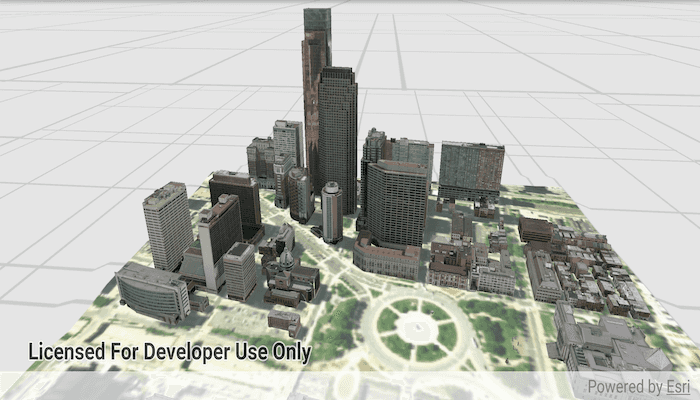Opens and displays a scene from a Mobile Scene Package (.mspk).

Use case
A mobile scene package is an archive containing the data (specifically, basemaps and features), used to display an offline 3D scene.
How to use the sample
When the sample opens, it will automatically display the Scene in the Mobile Scene Package.
Since this sample works with a local .mspk, you will need to download the file to your device.
How it works
- Create a
MobileScenePackageusing the path to the local .mspk file. - Call
MobileScenePackage.loadAsyncand check for any errors. - When the
MobileScenePackageis loaded, obtain the firstSceneusingmobileScenePackage.getScenes().get(0) - Create a
SceneViewand callsceneView.setViewto display the scene from the package.
Relevant API
- MobileScenePackage
- SceneView
Offline Data
- Download the data from ArcGIS Online.
- Open your command prompt and navigate to the folder where you extracted the contents of the data from step 1.
- Push the data into the scoped storage of the sample app:
adb push philadelphia.mspk /Android/data/com.esri.arcgisruntime.sample.openmobilescenepackage/files/philadelphia.mspk
Tags
offline, scene
Sample Code
MainActivity.java
/*
* Copyright 2019 Esri
*
* Licensed under the Apache License, Version 2.0 (the "License");
* you may not use this file except in compliance with the License.
* You may obtain a copy of the License at
*
* http://www.apache.org/licenses/LICENSE-2.0
*
* Unless required by applicable law or agreed to in writing, software
* distributed under the License is distributed on an "AS IS" BASIS,
* WITHOUT WARRANTIES OR CONDITIONS OF ANY KIND, either express or implied.
* See the License for the specific language governing permissions and
* limitations under the License.
*
*/
package com.esri.arcgisruntime.sample.openmobilescenepackage;
import android.os.Bundle;
import android.util.Log;
import android.widget.Toast;
import androidx.appcompat.app.AppCompatActivity;
import com.esri.arcgisruntime.loadable.LoadStatus;
import com.esri.arcgisruntime.mapping.MobileScenePackage;
import com.esri.arcgisruntime.mapping.view.Camera;
import com.esri.arcgisruntime.mapping.view.SceneView;
public class MainActivity extends AppCompatActivity {
private static final String TAG = MainActivity.class.getSimpleName();
private SceneView mSceneView;
// objects that implement Loadable must be class fields to prevent being garbage collected before loading
private MobileScenePackage mMobileScenePackage;
@Override
protected void onCreate(Bundle savedInstanceState) {
super.onCreate(savedInstanceState);
setContentView(R.layout.activity_main);
mSceneView = findViewById(R.id.sceneView);
// create a mobile scene package from a path to the mspk
mMobileScenePackage = new MobileScenePackage(getExternalFilesDir(null) + getString(R.string.philadelphia_mspk));
mMobileScenePackage.addDoneLoadingListener(() -> {
// check if the mobile scene package loaded and has a scene
if (mMobileScenePackage.getLoadStatus() == LoadStatus.LOADED && !mMobileScenePackage.getScenes().isEmpty()) {
// set the scene view's scene to the first in the mobile scene package
mSceneView.setScene(mMobileScenePackage.getScenes().get(0));
// set the scene view's camera
mSceneView.setViewpointCamera(new Camera(39.9625,-75.1771,310,139,75,0.0));
} else {
String error = "Failed to load mobile scene package: " + mMobileScenePackage.getLoadError().getMessage();
Toast.makeText(this, error, Toast.LENGTH_LONG).show();
Log.e(TAG, error);
}
});
mMobileScenePackage.loadAsync();
}
@Override
protected void onPause() {
mSceneView.pause();
super.onPause();
}
@Override
protected void onResume() {
super.onResume();
mSceneView.resume();
}
@Override
protected void onDestroy() {
mSceneView.dispose();
super.onDestroy();
}
}